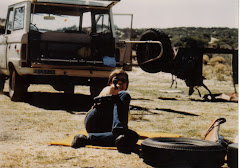
In Defense of a Dirty Lab
Friday, as a part of my job description, I was sent to a class on CPR. It was fine, I've been through the class before, and it's good to know. The class included the Heimlich Maneuver and the use of the Automated External Defibrillator. Since many of us work in areas of contaminated water and other liquids, we also had a discussion of ways to keep oneself from absorbing contaminants--followed by a solicitation for hazmat training.
Well, it's all information that I might find useful in my line of work--just last year, we were digging an access pit and dug into an area that had been saturated with petroleum at some time in the past. The soil from the entire area had to be separated, tested, placed into containers and shipped to a facility to be "cleaned." It ended up being over 500 tons of soil.
But, I digress.
As bull sessions do, this one wandered into the area of the cleanliness or filthiness of the objects and people with whom we come into contact. There were the usual anecdotes about filthy restaurants and people who don't wash their hands after using the facilities. It even got down to keeping one's paper towel in his hand for use in opening the bathroom door.
Ever the contrarian, I reminded everyone that in the not so distant past, individuals routinely shared drinking cups (the common metal cup kept near the hand pump), passed coke bottles from one friend to another (no backwash, please!), used porta-potties with no washing facilities in the area (not to mention outdoor toilets built over holes in the ground), helped bleeding accident victims without latex gloves--I even remember when dentists and doctors didn't wear latex gloves and protective glasses when working on people they didn't even know(!).
Somehow we survived.
Now, obviously surgeons have to use extreme measures for cleanliness in the operating theater, to avoid causing infections in the patient, but now they do it to protect themselves, as well. And obviously, I don't want to see medical people contracting illnesses--they should use whatever technology is available to them both for themselves and for their patients--but twentieth and nineteenth century doctors survived by means of good hygiene and whatever other things they did to avoid contamination.
The point is not to disparage current hygiene methods, but to remember that one does occasionally have to (shudder) touch people and things with one's bare skin. We shake hands. We use public drinking fountains. We open doors and press buttons in elevators. We kiss aunts 'pon the cheek and even (ugh!) on the lips. We kiss our dates, our girl/boy friends and our husbands/wives.
Points were made that we don't really know how clean was the restaurant in which we just dined. Were the dishes really washed and sanitized? Were the chefs and other food handlers healthy and washed? Was the food as high in quality as we'd expect? Was that "A" placard in the window earned, or was it bought?
Our immune systems are wonderful, and indispensable. It's strengthened by exposure to minor amounts of toxins and pathogens. Whenever we get sick, our bodies fight the illness. After we get well, our blood has antibodies against that disease, and we don't get it again.
My argument went this way: If one were capable of living a sanitary life, he might be able to avoid diseases for however long he might live. What kind of life would it be? One couldn't handle, touch or be near any object that hadn't previously been sanitized. One could only breathe scrubbed air. One couldn't touch, be near or breathe air exhaled by another individual.
I find it far more desirable to be among people--filthy beasts as they might be--by shaking hands, chatting face to face, riding in planes, trains and automobiles, sharing elevators and occasionally even using public drinking fountains, swimming pools and bathrooms. It's the stuff of which a great life is made.
I'll have to trust that my immune system will handle it.
Every year I get a head cold and every five years or so I get a flu. Those nasty bastards I call friends and acquaintances must have really taxed my immune system!
What doesn't kill you makes you stronger.
Warm regards,
Col. Hogan
Stalag California






6 comments:
You must have heard about the waiter at a local restaurant who came up with a neat idea to save wasted trips when a customer dropped a spoon on the floor. He came up with the idea of placing a piece of string to a spoon and hanging it off his shoulder. When a customer asked why there was a spoon hanging there he’d explain how much time was saved by just handing him the new spoon rather than having to go clear back to the kitchen for one that had been dropped on the floor.
The customer was impressed with the ingenuity and efficiency of action. He thought it was a great idea until a week later he was in the restroom and over heard a conversation between two waiters. One asked why the other wasn’t washing his hands after having used the urinal. “I don’t have to because I use my spoon to put it back; I never touch it with my hands.”
I was recently diagnosed with Giardia
How inconvenient that I'm a water treatment operator!
It's good to keep clean, but you have a point, things used to be very bad decades ago. It's only recently that everyones going beserk on germs, anti-bacterial this and that. A bit of dirt and germs aren't going to kill ya. Keeps the immune system on its toes.
TF,
I know that waiter. He works at Jerry's Famous Deli in Studio City. He likes to call himself an actor.
Oswald,
If they put the giardia parasite on the endangered species list, you might be stuck with it.
MK,
That's my theory. If you stay too clean, you won't have any antibodies. Remember the story "War of the Worlds?" The Martian beasties died from the common cold.
Post a Comment